One of the most problematic syndromes with horses is tying up. What happens is the horse can suffer muscle damage that leaves them unable to perform. An episode can include muscle stiffness and twitching, excessive sweating, a high heart rate, and reluctance to move. There has been a lot of research to find out the causes and how to treat them. Generally the best option is to adapt the horse feed, ensure they get enough water, and look at the level of exertion.
What we want to do here is look specifically at some of the changes you can make to a horse’s diet. There are a number of things that can reduce the risk of tying up episodes.
Limit NSCs
An important thing to do is limit the amount of nonstructural carbohydrates (NSC) in the diet. This includes things like sugars and starch. Ideally you want the total to be less than 20%. Depending on the actual disorder, you may want to get this down as low as 10%.
You can check the specific horse feed you use to determine the level of NSCs. The producer should also be able to give you the information if you contact them. Plus, you can analyse hay and other silage to check the NSC level. While at pasture, if the grass is lush, it will likely have high sugar levels. So, it can be a good idea to use a muzzle to limit grazing.
High energy diets
Some horses need a high calorie diet to maintain their weight or account for the amount of work or exercise they do. However, this can increase the risk of tying up if you aren’t careful. The best thing to do here is choose feeds that are higher in fat instead of high sugar. What you want is more complex carbs for energy rather than NSCs.
Electrolytes and minerals
You need to ensure the horse feed has sufficient electrolyte and mineral levels. Important things to look at here include calcium, potassium, and magnesium because they all help with muscle function. You also need to provide enough salt to get sodium and chloride into the diet. Keep in mind that mineral levels drop more due to sweating, so you will need to increase intake for horses as they do more work or exercise.
Water
Proper hydration is essential for muscle function too. So, you need to make sure you provide enough clean water for horses. Think about the weather and how much exercise they have been doing. You may need to increase the volume to account for what is lost due to sweating.
Antioxidants
Finally, it can be a good idea to increase antioxidant levels. Some horses can have a big problem with free radicals due to the diet and metabolism. They can lead to muscle damage. Luckily, you can tackle them by increasing the amount of antioxidants. If you have a horse that is prone to tying up, you may need to dramatically increase the level of vitamin E and selenium.
Come to us to order horse feed
At JS Hubbuck Ltd we appreciate that the UK is full of people that love horses. You need to ensure you get the diet right for each one to give them the best quality of life. The core of this is always high quality food. It can also help address health concerns like tying up.
If you are looking to order high quality horse feed, you can speak to us. We would be happy to advise you and showcase the products we have to offer.

